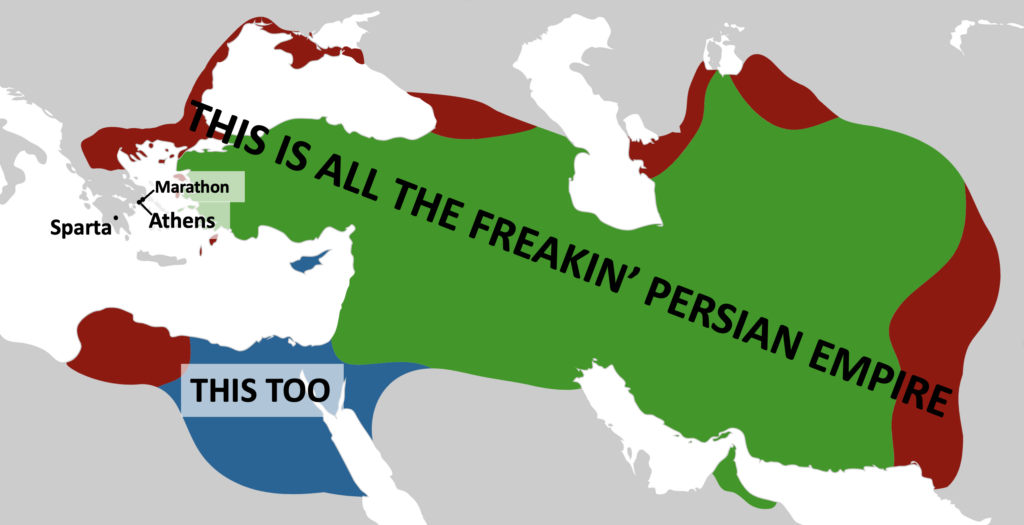Tonight, we dine on bananas!
Ancient Greece’s “first marathon” was more impressive than you’ve heard

In the popular imagination, the Battle of Marathon – fought 2,513 years ago today, roughly 26.2-ish miles northeast of Athens – is famous for exactly one thing: As it ended, a messenger ran back to the great big polis to tell everybody about the Athenian victory, and then promptly died from the effort. In this way, the dude – Pheidippides, as he’s most commonly called – inspired a lot of fitness maniacs many centuries later to basically do the same thing.
This legend is nothing more than some very old bullshit, but according to the nigh-contemporary historian Herodotus, the truth is actually cooler: Pheidippides was essentially one of the world’s first known ultra-marathoners.
The battle was an early turning point in the Greco-Persian Wars (492-449 BCE), which, like most wars, was about someone wanting someone else’s land. In this case, the Persians were after all of Greece, and they planned to start with Athens, the future home of Plato and Aristotle and Arianna Huffington.

That map shows part of why Persia thought it would be pretty easy to gobble up Greece. Another reason? “Greece” wasn’t really Greece, but just a mishmash of city-states that had been squabbling over internal borders for centuries. As for the dueling titans of Athens and Sparta, though they’d both been keeping a wary eye on Emperor Darius’s designs, hadn’t really firmed up plans to join forces if push came to shove.
When the Persians landed at Marathon, Athens quickly did two things: They dispatched a messenger to Sparta for help, and they took a poll among their generals about whether to attack at Marathon or stay put and prepare to defend Athens. By a 6-5 tally, the brass decided to attack … and won in a day, killing 6,400 of the invaders while losing just 192. (hey Persia, maybe rethink the wicker shields.)
As for the messenger: Yes, we’re talking about Pheidippides. He didn’t make it to Sparta in time for those guys to actually join the battle, but he did cover 147 miles on foot in just two days (and then didn’t die). Not long after the Spartans arrived to survey the battlefield, they hatched a plan to make a pan-Hellenic congress that could unite and defend the whole region. Ten years later, when Darius’s son Xerxes showed up for the Battle of Thermopylae, it wasn’t just 300 Spartans who fought, but a (still small) group of about 4,900 from various city-states – including 700 Thespians, which is far more than they needed for the Zack Snyder movie.
Long story short: Persia never conquered Greece, but were conquered themselves by Alexander the Great in 330 BCE.
Made-up or otherwise, the story of Pheidippides’s fatal run from Marathon to Athens persisted through the centuries, and in 1894, when some Frenchmen were musing on starting up a new Olympics in Athens, a linguist named Michel Bréal reckoned they should reenact the famous run. Apparently everyone else said “mais oui”; local-to-Greece hero Spyridon Louis famously won the first such race in 1896 (he didn’t die either).
Nowadays, at least the top 10 fastest marathon finishes of all time belong to runners from East Africa, as do nine of the top 10 times for women (we see you, former world record holder Paula Radcliffe). But if you want to find the fastest person over 48 hours, you don’t need to look any farther than good ol’ Greece, where Yiannis “Son of Pheidippides” Kouros once covered more than 294 miles in two days.
His nicknamesake would be proud: That’s about twice what Pheidippides himself did over that time span. Or, you know, more than 11 “marathons.”
